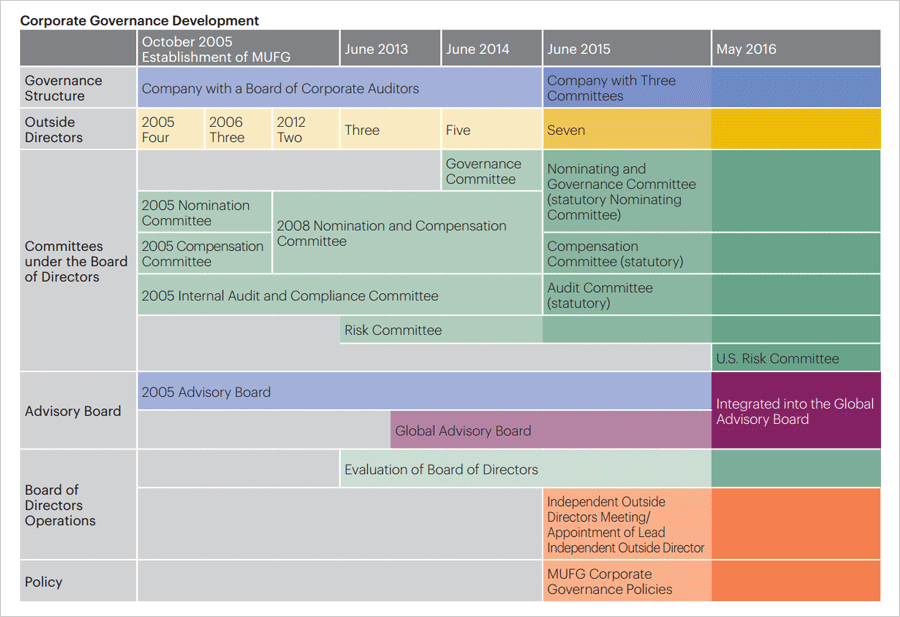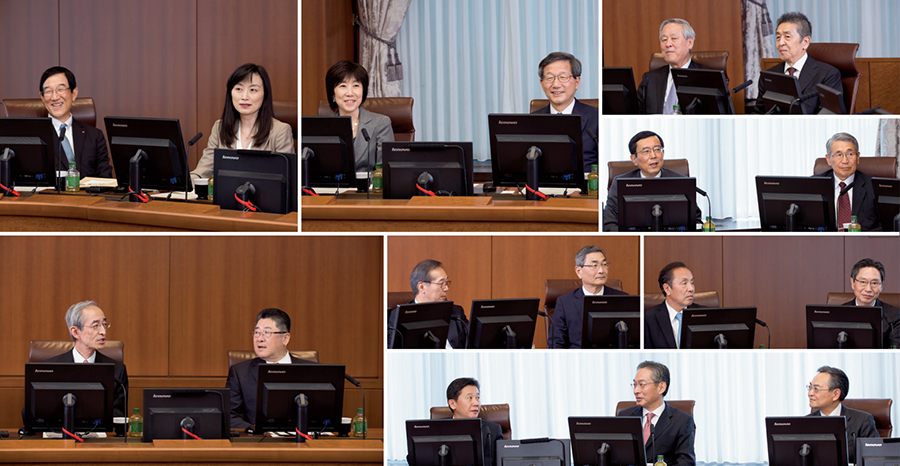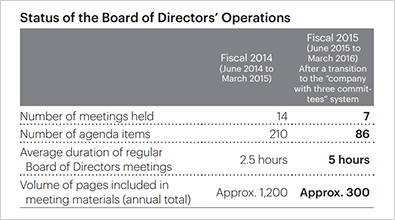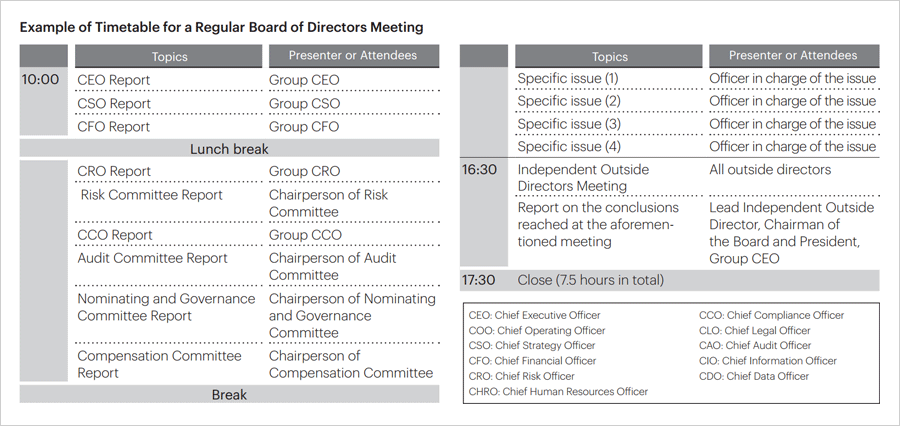Strengthening a Governance Structure That Supports Corporate Value

MUFG Board of Directors Meeting held on June 29, 2016
Fundamental Concepts
MUFG will aim for sustainable growth and the increase of corporate value over the medium- to long-term, in consideration of the perspectives of its stakeholders, including shareholders as well as customers, employees and local communities. MUFG will aim to realize effective corporate governance through fair and highly transparent management based on the guidance provided by MUFG Corporate Governance Policies established in May 2015.
Steps to Improve Our Governance Structure
Since its establishment, MUFG has worked to build a stable and effective corporate governance structure, putting emphasis on ensuring external oversight. In June 2015, MUFG transitioned to the “company with three committees” governance structure. The functions of oversight and execution in the holding company are separated, thereby strengthening the oversight function of the Board of Directors and the committee system has also been reorganized for more effective governance. We are aiming for a governance framework that will be more familiar and transparent to overseas stakeholders, in line with our status as a G-SIB (Global Systemically Important Bank).
In May 2016, MUFG established the U.S. Risk Committee, and in June, three of its core subsidiaries, namely, The Bank of Tokyo-Mitsubishi UFJ, Ltd., Mitsubishi UFJ Trust and Banking Corporation and Mitsubishi UFJ Securities Holdings Co., Ltd., transitioned to the “company with audit and supervisory committee” governance structure. In the same month, MUFG Corporate Governance Policies were formulated to provide an overarching philosophy and framework guiding corporate governance at these and all other Group companies.


Strengthening the Function of the Board of Directors
Having transitioned to the “company with three committees” structure in 2015, MUFG is striving to strengthen its corporate governance and the function of the Board of Directors.
Operational Status of the Board of Directors
The Board of Directors decides on basic management policies while taking on the supervision of management activities. In principle, business matters other than those reserved for the Board of Directors in accordance with the law are delegated to and decided on by corporate executive officers. However, particularly important matters (listed below) are discussed and decided on solely by the Board of Directors.
- • Management strategy, risk management policy, capital policy, resource allocation and other basic management policies for the entire Group
- • Supervision of directors and corporate executive officers who take on business execution
- • Internal control systems for the Group and the monitoring of the development and operation of such systems
- • Appointment of corporate executive officers
- • Oversight of initiatives to develop a corporate governance structure and to facilitate a sound corporate culture
Having transitioned to the “company with three committees” structure in June 2015, MUFG reviewed the agenda discussed at Board of Directors meetings while examining the operation of the Board (including the frequency of such meetings). As a result, the number of meetings was decreased by half, and the number of agenda items was cut by approximately 60%. On the other hand, the duration of regular Board of Directors meetings increased from 2.5 hours to 5 hours due to a longer time being allocated to discussions.

Board of Directors meetings are followed by Independent Outside Directors Meetings attended only by outside directors. At these meetings, attendees engage in deliberations regarding such matters as the operation of the Board of Directors and committees, collaboration between the Board and corporate executive officers, and possible measures to enhance the function of outside directors. Conclusions reached at this meeting are reported to the chairman, who heads the Board of Directors, and the president by a Lead Independent Outside Director.


Stepping Up Support for Outside Directors
Board Educational Sessions are held to support independent outside directors by providing necessary information beyond the scope of the discussion agendas of the Board of Directors meetings. Outside directors attend these sessions to be apprised of MUFG’s business operations and the management environment surrounding it, immediately after their appointment and on a regular basis during the term of their service.
In fiscal 2015, MUFG held four such sessions. Themes for these sessions were selected based on opinions voiced at the Board of Directors meetings and Independent Outside Directors Meetings and included such matters as MUFG’s strategies for the Americas business, the operations of Morgan Stanley and the Bank of Ayudhya and the outline of IT systems as well as business plans for fiscal 2016.
Separately, MUFG held a Board Educational Session for newly appointed outside directors in July 2015 under such themes as MUFG’s governance structure, management vision and its medium-term business plan.
Evaluation Framework of the Working Practices of the Board of Directors’ Operations
Since 2013, with the aim of enhancing the function of its Board of Directors, MUFG has introduced a framework to regularly evaluate the Board of Directors’ working practices through implementation of a PDCA cycle.
External consultants interview each director on the composition of the Board of Directors, the content of agendas, the discussions at Board Directors meetings, the operations of the Board, and the Board’s contributions. Results of these interviews and assessments by consultants are reported and discussed by the Nominating and Governance Committee and the Board of Directors.

